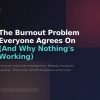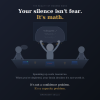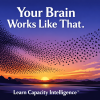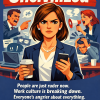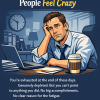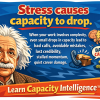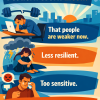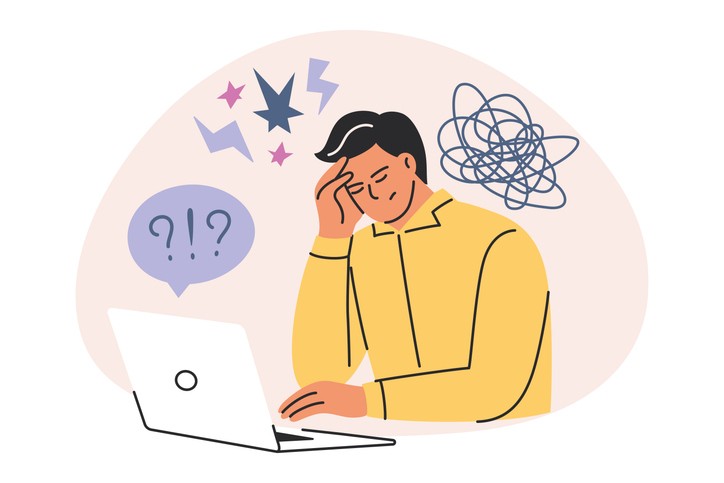
The Tired Professional's Hero's Journey
Finding Calm, Connection, and Confidence at Work
Most days, it feels like the modern workplace is a labyrinth designed by someone who never had a deadline in their life. Emails pile up like wet laundry, Slack pings pull you sideways, and somewhere between the 9 a.m. meeting and the 9 p.m. "quick reply," you realize you haven't had a full breath all day.
If you're a professional who struggles with anxiety, stress, or just trying to string a sentence together in meetings without second-guessing yourself—you're not broken. You're human. And your brain is running an old script.
The good news? Like every hero, you're on a journey. And the arc of that journey—the Hero's Journey—is the perfect map for learning emergent skills: those workplace superpowers like calm under pressure, stress mastery, and authentic communication that help you survive and even thrive.
Act 1: The Call to Adventure
(a.k.a. "Something Has to Change")
It usually starts with exhaustion. Maybe it's lying awake at 2 a.m. doing insomnia math—"If I fall asleep now, I'll get four hours, three hours, two hours…". Maybe it's realizing you sat through an entire meeting rehearsing what you might say but never actually said it. Or maybe it's just the creeping dread of another week that feels like survival, not growth.
This is the Call to Adventure. Anxiety, stress, and communication blocks aren't defects—they're signals. They're your nervous system saying: we need new skills.
When insomnia becomes your unwanted companion, rest and recovery mastery offers a path forward beyond counting sheep.
Act 2: Entering the Unknown
Crossing the threshold is awkward. You try the usual fixes—apps, supplements, maybe another productivity hack—and still end up drained. Here's the trap: the Planning Fallacy convinces you that "this week will be different" while you underestimate how long things actually take. Or the Spotlight Effect whispers that everyone notices your every stumble, keeping you quiet in meetings.
This is where emergent skills come in—not as quick fixes, but as tools you can grow into:
- Confidence & Calm Under Pressure → for performance anxiety and overthinking. If presentation anxiety is the issue, explore calming approaches
- Stress Mastery & Work-Life Balance → for burnout risk and endless to-do lists. When work follows you home, boundaries need attention
- Connection & Communication Skills → for the isolation and second-guessing that come with stress. Building authentic communication transforms workplace interactions
These skills don't erase the chaos of work. They give you a way to walk through it without losing yourself.
Act 3: Allies and Tools Appear
Like any hero, you don't go alone. Research-backed practices become your allies:
Cognitive Defusion (ACT skill)
Noticing thoughts like "I'm not good enough" as mental events, not facts.
Future Directed Thinking
Focusing on creating positive expectations rather than replaying past mistakes. For procrastinators, productivity and achievement skills offer a structured path forward.
Habit Design
Stacking tiny behaviors that compound into real change (the 1% better rule). When focus is the challenge, focus and self-management skills provide practical scaffolding.
The FORD Method
Family, Occupation, Recreation, Dreams—scaffolding for less-awkward conversations.
Connection Practices
Because loneliness hits health as hard as smoking 15 cigarettes a day.
Each of these is a skill, not a miracle. You practice, you wobble, you practice again. Slowly, the unknown becomes a little more navigable.
Act 4: Trials, Resistance, and Setbacks
Every hero faces dragons. For professionals, those dragons often look like:
Overwhelm spirals
Your amygdala hijacks your prefrontal cortex, making clear thought nearly impossible. Learning emotional mastery helps you regain control.
Negativity bias
You remember the one frown in the room, not the nine nods. When self-doubt creeps in, confidence and self-worth building becomes essential.
Systemic friction
Workplaces that reward burnout instead of balance. For those feeling the weight, motivation and emotional resilience offer a lifeline.
This is the hard middle. Skills don't "stick" overnight. But here's the reframe: resistance means you're in the right place. Growth always feels uncomfortable before it feels natural.
Act 5: Transformation
Then one day, something shifts. Maybe you catch yourself taking a 4-7-8 breath before a tense conversation. Maybe you use the FORD method at lunch and realize connection doesn't have to feel like performance. Maybe you finally say, "I need 10 minutes to prioritize" instead of drowning quietly.
This is transformation—not dramatic, but deeply human. You're not free from anxiety, stress, or the mess of human communication. You're free within them.
During major life transitions, resilience through life transitions provides the framework for navigating change with grace.
Act 6: Return with the Elixir
Every Hero's Journey ends with bringing something back. For you, it's the ROI of emergent skills:
- Time saved by cutting procrastination loops
- Energy preserved by setting boundaries instead of firefighting
- Health gained by interrupting stress before it spirals into burnout
- Connection rebuilt with colleagues, friends, and even yourself
The tired professional returns—not perfect, not flawless, but carrying tools that make the next day a little lighter.
Multi-Pathway Next Step
This is just one path. Your brain may need another. You can explore emergent skills through different routes:
Cognitive
Thought tools like reframing or ACT defusion
Neurodivergent-affirming
Low-energy or sensory-friendly adaptations
Environmental
Workplace design, workload fairness, and systemic support
Skill-building
Step-by-step micro-habits with visible ROI
Explore the path that fits your brain and your context. For starters:
Final Word
You don't have to slay every dragon at once. Start with one tiny skill—one breath, one sentence, one boundary. The Hero's Journey is not about being fearless. It's about walking forward even when tired.
Your story isn't "I burned out."
Your story is: I learned new skills and came back stronger.
Start Your Free 30-Minute Journey
Every 30 minutes adds a new skill to your toolkit. You’ll walk away stronger, whether the shift is big or small.

